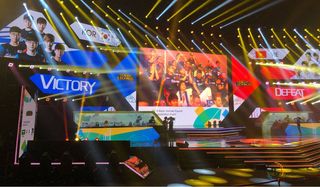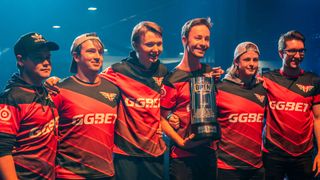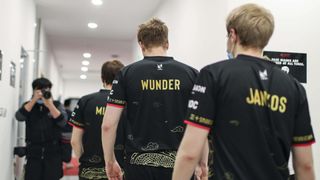Pro-esport players are Athletes, change my mind
Does that mean engineers are too?

With esports becoming such a renowned, worldwide superpower, this constantly growing enterprise boasts a global audience of over 400 million people. Esports scholarships are being handed out, and the industry stands to make or break the professional careers of thousands of gamers alike.
As with any international phenomenon, there seems to have arisen a great deal of controversy. Specifically, around whether the words sports and athletes are being used appropriately, or whether they make a mockery of the rich legacy of sports and athletes, laid down over almost three millennia.
Here are the big questions people are asking:
- Is esports a real sport?
- Should pro esports players really be called athletes?
What defines a sport?
Collins Dictionary has sports pegged as "competitive leisure activities which need physical effort and skill." Cambridge Dictionary similarly defines sport as "a game, competition, or activity needing physical effort and skill that is played or done according to rules, for enjoyment and/or as a job."
Sport is actually a classification of games. Both terms are defined similarly by competitiveness and adherence to rules, but sport differs in one key way. Where games often rely on an element of chance, such as in gambling, sport is primarily a game of skill and requires an element of physical effort.
While there should be no doubt that pro-players exhibit a tonne of skill, there is some speculation that pro-players do not exert enough physical effort for their activities to be considered a sport—tell that to the esports pros suffering from repetitive strain injury, or tennis elbow.
In fact, there are plenty of games that are officially considered sports that involve a heck of a lot less physical exertion. The Association of IOC Recognised International Sports Federations (ARISF) considers bridge and chess sports, both of which are played sitting down. Esports, however, still lies in the fringes—it has even been deemed too violent to be recognised as a sport, and "not compatible" with Olympic values.
The biggest gaming news, reviews and hardware deals
Keep up to date with the most important stories and the best deals, as picked by the PC Gamer team.
That being said, the history of esports players harming one another physically is pretty thin, considering its a no-contact activity. However, I have seen some horrific martial arts injuries. Besides, have you ever watched a takedown in American Football? Hot damn!

Who qualifies as an athlete?
It's no secret that pro esports players train hard. They toil daily, just like any other athlete, in order to hone their skills, and they compete professionally for a prize. All these things should put them in the running to be held as athletes, right?
But, by the logic that follows, should my engineer friends who trained, toiled, and competed in a robot-wars like contest at university not also be considered athletes? They spent hours hunched over their machines, focused and sweating all day in a workshop. They trained their minds, and their reflexes, in order to compete and win.
I mean, technically they competed, but maybe the robots are the real athletes? As you can see, it all gets a little fuzzy around semantics, so here's some more etymology for you.
The definition of an athlete, as it stands with Collins Dictionary, is "a person who does a sport, especially athletics, or track and field events." And Cambridge Dictionary describes an athlete as "a person who is very good at sports or physical exercise, especially one who competes in organized events."
Note the phrases "or physical exercise," and "especially athletics" are used, meaning the term athletes is not exclusive to physical versions of sports. So surely, as long as esports can be considered a sport, pro esports players should be able to consider themselves athletes. There's nothing here about the necessity of being in peak physical condition, though it may surprise you that many pro esports players are involved in a strict regime of physical exercise.
Just a note, although it's not actually stated in the dictionary, I'm pretty sure athletes cannot be robots. However, this may be subject to change in the near future.

Where do we stand?
In a very grey area, that's where. The main arguments seem to boil down to the blurred lines between what counts as physical activity and fitness (which mean different things for different people), as well as whether the inclusion of violence should disqualify an activity from being regarded as a sport (which is just total rubbish).
Perhaps if esports players used standing desks more often, or played more nonviolent games, could they then finally consider themselves athletes? And, with F1 esports looking forward to a bid for the Olympics, why not other non-violent games like Stardew Valley, or Pong?
I'll be honest, not using the word athletes feels as if it undermines all the effort, the hours of labour, tears, and frustration these professional esports players endure on a daily basis. And, at the end of the day, definitions are fluid.
Humanity has been redefining words for as long as words have existed, and adaptation is how we advance as a species. Lines that are drawn shift constantly, and are never quite as finite as we would like to think.
So, while the definitions of all the above terms will vary with time, one thing is for certain: the future is becoming increasingly digitised. Eventually, esports players may be suited up and shoved into virtual reality tournaments, to compete with other pro-teams in increasingly physically strenuous activities.
So, once esports athletes are playing real physical sports, against real people, but in a digital arena, where will the lines be drawn then? And, who's to say they aren't already athletes—just because they might not be able to sprint the hundred meters.
Just because their pitch is digital and doesn't need watering?
Personally, I can't wait to see the likes of Euro Truck Simulator 2 plastered up on the pro athletes screens at major Olympic esporting events.

Screw sports, Katie would rather watch Intel, AMD and Nvidia go at it. Having been obsessed with computers and graphics for three long decades, she took Game Art and Design up to Masters level at uni, and has been rambling about games, tech and science—rather sarcastically—for four years since. She can be found admiring technological advancements, scrambling for scintillating Raspberry Pi projects, preaching cybersecurity awareness, sighing over semiconductors, and gawping at the latest GPU upgrades. Right now she's waiting patiently for her chance to upload her consciousness into the cloud.
Most Popular

